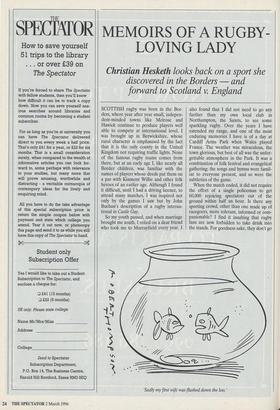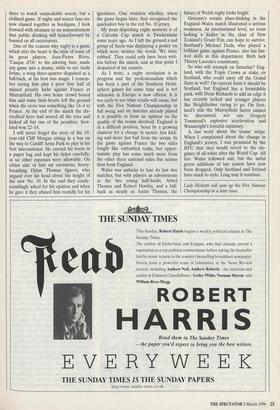MEMOIRS OF A RUGBY- LOVING LADY
Christian Hesketh looks back on a sport she
discovered in the Borders — and forward to Scotland v. England
SCOTTISH rugby was born in the Bor- ders, where year after year small, indepen- dent-minded towns like Melrose and Hawick continue to produce players well able to compete at international level. I was brought up in Berwickshire, whose rural character is emphasised by the fact that it is the only county in the United Kingdom not requiring traffic lights. None of the famous rugby teams comes from there, but at an early age I, like nearly all Border children, was familiar with the names of players whose deeds put them on a par with Kinmont Willie and other folk heroes of an earlier age. Although I found it difficult, until I had a driving licence, to attend many matches, I was inspired not only by the games I saw but by John Buchan's description of a rugby interna- tional in Castle Gay.
So my youth passed, and when marriage brought me south, I relied on a dear friend who took me to Murrayfield every year. I . also found that I did not need to go any further than my own local club in Northampton, the Saints, to see some sparkling rugby. Over the years I have extended my range, and one of the most enduring memories I have is of a day at Cardiff Arms Park when Wales played France. The weather was miraculous, the town glorious, but best of all was the unfor- gettable atmosphere in the Park. It was a combination of folk festival and evangelical gathering; the songs and hymns were famil- iar to everyone present, and so were the subtleties of the game.
When the match ended, it did not require the effort of a single policeman to get 60,000 rejoicing spectators out of the ground within half an hour. Is there any sporting crowd, other than one made up of racegoers, more tolerant, informed or com- panionable? I find it insulting that rugby fans are now forbidden to take drink into the stands. For goodness sake, they don't go `Sadly my first wife was flushed down the loo.' there to watch unspeakable soccer, but a civilised game. If rugby and soccer fans are now classed together as hooligans, I look forward with pleasure to an announcement that public drinking will henceforward be banned on all racecourses.
One of the reasons why rugby is a game which stirs the heart is the style of some of its great players. Jean-Pierre Rives, `Casque d'Or' to his adoring fans, made any game into a drama, while to see Andy Irvine, a wing three-quarter disguised as a full-back, at his best was magic. I remem- ber seeing him play a poor first half of missed penalty kicks against France at Murrayfield. His own home crowd booed him and some faint-hearts left the ground when the score was something like 14-4 to France. At the end of the match the dis- credited hero had scored all the tries and kicked all but one of the penalties. Scot- land won 22-14.
I will never forget the story of the 19- year-old Cliff Morgan sitting in a bus on the way to Cardiff Arms Park to play in his first international. He carried his boots in a paper bag and kept his ticket carefully, as no other expenses were allowable. On either side of him sat enormous, heavy- breathing Dylan Thomas figures, who argued over his head about the height of the new No. 10. In the end they conde- scendingly asked for his opinion and when he gave it they abused him roundly for his ignorance. One wonders whether, when the game began later, they recognised the quicksilver boy in the red No. 10 jersey.
My most dispiriting rugby memory is of a Calcutta Cup match at Twickenham some years ago. As I left the ground a sad group of Scots was displaying a poster on which were written the words 'We were robbed'. They could only have been writ- ten before the match, and at that point I despaired of my country.
As I write, a rugby revolution is in progress and the professionalism which has been a part of the Southern Hemi- sphere games for some time and is not unknown in Europe is now official. It is too early to see what results will ensue, but with the Five Nations Championship in full swing and six matches already played it is possible to form an opinion on the quality of the teams involved. England is in a difficult position, beset by a growing clamour for a change in tactics: less kick- ing and more fast ball from the scrum. In the game against France the two sides fought like embattled tanks, but oppor- tunistic play has come much more from the other three national sides this season than from England.
Wales was unlucky to lose its last two matches, but with players as adventurous as the two young half-backs, Arwel Thomas and Robert Howley, and a full- back as steady as Justin Thomas, the future of Welsh rugby looks bright.
Grayson's erratic place-kicking in the England—Wales match illustrated a serious weakness. At international level, no team lacking a kicker in the class of New Zealand's Grant Fox, can hope to survive. Scotland's Michael Dods, who played a brilliant game against France, also has lim- ited skills in this department. Both lack Thierry Lacroix's consistency.
So who will triumph on Saturday? Eng- land, with the Triple Crown at stake, or Scotland, who could carry off the Grand Slam as well? On current form it should be Scotland, but England has a formidable pack, with Dean Richards to add an edge it has recently lacked and younger players like Sleightholme raring to go. On Scot- land's side the Murrayfield factor cannot be discounted, nor can Gregory Townsend's explosive acceleration and Wainwright's forceful captaincy.
A last word about the teams' strips. When I complained about the change in England's jerseys, I was promised by the RFU that they would revert to the ele- gance of all-white after the World Cup. All lies. Wales followed suit, but the awful green additions of last season have now been dropped. Only Scotland and Ireland have stuck to style. Long may it continue.
Lady Hesketh will sum up the Five Nations Championship in a later issue.



































































 Previous page
Previous page